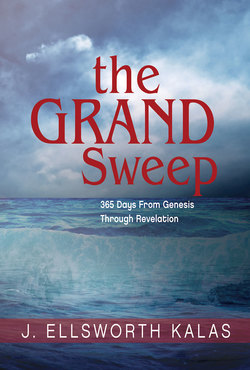Читать книгу The Grand Sweep - Large Print - J. Ellsworth Kalas - Страница 36
На сайте Литреса книга снята с продажи.
ОглавлениеPrayer Time
Let us confess our sins daily with some deeper levels of insight, trying to understand what qualities in us are behind our perhaps relatively harmless deeds.
How the Drama Develops GENESIS 46—EXODUS 12
Israel’s sense of nationhood comes into full development in these chapters. It begins with Jacob’s address to his sons: “Gather around, that I may tell you what will happen to you in days to come” (Genesis 49:1). The language is sometimes descriptive of the son himself, but often of the role of the descendants as part of a nation—for example, Zebulun as “a haven for ships,” Dan as a judge of the people, and Asher as a source of agricultural provision. And as both Jacob and Joseph die, there is a sense of nationhood and of place; they are not to be buried in Egypt, but their bones are to be carried to the land promised to Abraham, Isaac, and Jacob (49:29-33; 50:25).
Then the Egyptians played a major role in developing Israel’s sense of family. The children of Israel were already isolated by their feeling of uniqueness; but when Egypt, in fear, made them into a nation of slaves, that uniqueness was hardened into passions of identity and loyalty. And the more fiercely the government sought to destroy the people, the more they must have been driven to feelings of national pride.
Out of and back into this maelstrom comes Moses. What a remarkable story! First he is destined to infant execution, then saved to be raised in luxury and opportunity. Then, prepared for a unique role of leadership, he instead becomes a fugitive and remains such during the years ordinarily seen as the best years of one’s life.
Then he enters into the monumental years of his ministry as liberator, leader, and lawgiver. We see him in these chapters as he and his brother Aaron engage Pharaoh and his council in a war of nerves. Pharaoh would be a hard enough person to deal with under the best of circumstances, for it’s hard to negotiate with someone who is accustomed to exercising absolute power. But the struggle is accentuated by Pharaoh’s inner struggle. It is as if he is himself the battlefield on which the future of God’s people, Israel, is being fought.
The series of plagues comes to its climax in the visit of the death angel, with claim on the firstborn. Moses gives the people of Israel specific instructions to protect their households. This is the night of the Passover, “the beginning of months” for Israel and “a day of remembrance” (Exodus 12:1-2, 14). It is their day of Exodus, of leaving Egypt after 430 years of residency, most of those years as slaves.
And with this event, the drama takes a new turn. The family of Jacob went into Egypt as nothing more than that, a large family; now they emerge as a nation. The Passover will later be a symbol for Christians of their new Passover in Jesus Christ, their Paschal Lamb; and the Exodus will be a fitting symbol of each soul’s deliverance from the bondage of sin.
Seeing Life Through Scripture
I remember a song from my childhood—one that apparently has not stood the test of time—that had the singer testifying to having once lived “in Egypt’s bondage” but now being set free and living in Canaan land. The tune was probably overly simple, but the scriptural image was valid. The New Testament writers would have approved of it. They saw Israel’s slavery as typifying a person’s bondage to sin, and the Exodus was therefore a picture of salvation.
Many a convert will respond to those figures of speech, particularly those persons who have been saved from the more dramatic sins—from drugs or other addictions or from some especially shattering experience. But the imagery is not so reminiscent for those who grow up in a relatively moral pattern, probably in Sunday school and church, and whose sins don’t seem so much like slavery. They may, in fact, be the kinds of sins we joke about.
But a moral theologian would remind us that sin is sin. As a former teacher of mine used to say, “A pinprick is the doorway of death.” What we need is not to be more notable sinners but to be spiritually sensitive enough to comprehend the real nature of sin and our capacity for evil.
The Sum of It All
“Then the LORD said, ‘I have observed the misery of my people who are in Egypt; I have heard their cry on account of their taskmasters. Indeed, I know their sufferings, and I have come down to deliver them’ ” (Exodus 3:7-8).
